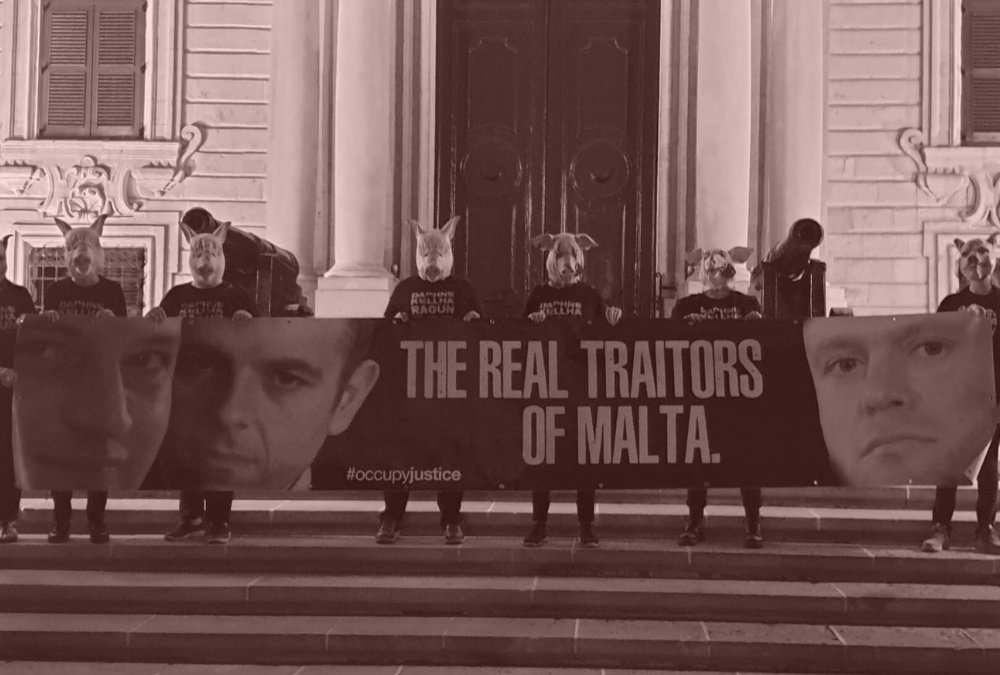On Monday, the Court of Appeal confirmed a previous court’s decision to annul the hospitals concession awarded to Vitals Global Healthcare (VGH) and Steward Healthcare.
The response to this landslide decision has been proportional from all quarters except from the government, which, true to its form, reacted by reviling the general public with tonnes of gaslighting while pointing fingers at its perceived enemies.
Civil society is appropriately pissed off. At 10pm on Tuesday, Occupy Justice Malta sent out a press release showcasing the police headquarters’ latest set of decorations.
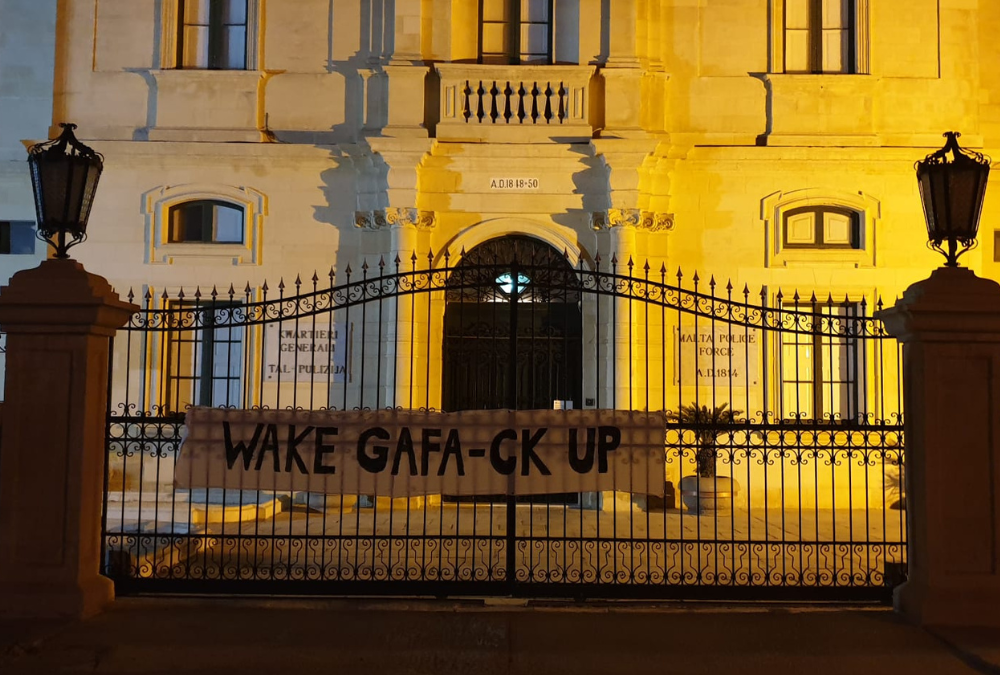
A banner that reads “Wake Gafa-ck up’, a reference to police commissioner Angelo Gafa’s failure to prosecute high-profile politicians linked with corruption scandals. Photo: Occupy Justice Malta
Given that the VGH/Steward Healthcare saga involves a complex web of interests, this article points out the key connections, the enablers, the decision-makers, and the behind-the-scenes investors that were involved since day one.
Cabinet

The National Audit Office’s (NAO) reports, along with several investigations carried out by both the local and the international press, have extensively documented the involvement of the former and current Cabinet members who oversaw the hospitals concession, as outlined in the image above.
The key decision-makers in the saga were disgraced former prime minister Joseph Muscat, disgraced former health minister Konrad Mizzi, disgraced former economy Chris Cardona, former finance minister Edward Scicluna, and health minister Chris Fearne.
Besides having spearheaded the deal as prime minister, Muscat’s contractual ties with a consultancy firm that received millions of euros from Steward Healthcare were exposed in an investigation carried out by the Times of Malta. His disgraced former chief of staff Keith Schembri was directly involved in key meetings related to the VGH deal.
In a now infamous press conference, Fearne had described Steward’s full acquisition of both the concession and the previous concessionaire’s shares as “the real deal“. He consistently defended the government’s approach to the concession even when it was apparent that it was going awry.
Scicluna had shaken off responsibility for his ministry’s involvement in the deal, eliciting incredulous replies from the Daphne Caruana Galizia public inquiry’s board of judges when Projects Malta’s directors had contradicted him in court.
Mizzi was by far the minister who was most directly involved in the deal’s nuts and bolts. Mizzi is the minister who signed off on multiple side agreements with VGH/Steward Healthcare. These side agreements extended the time frame for the concession’s contractual milestones despite the fact that the concessionaire had failed to reach any of them.
On behalf of the government, Cardona had signed a memorandum of understanding with VGH months before any official call for proposals was issued. The Shift had written a thorough explainer about how the memorandum was signed.
Projects Malta
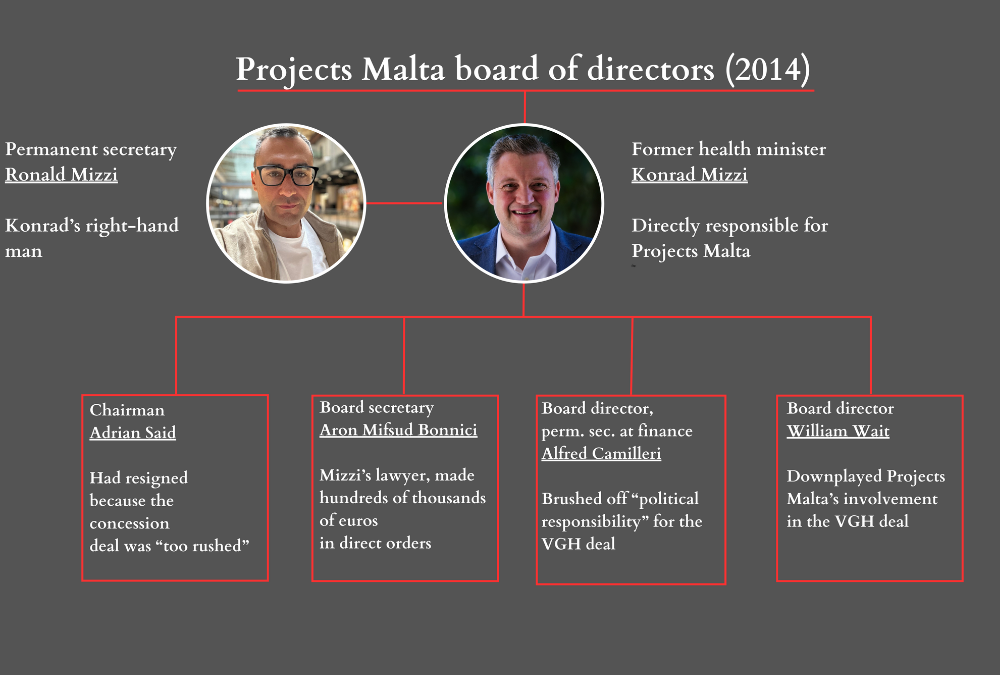
The key government-owned entity that coordinated the entire process that led to the concession agreement was Projects Malta, which later rebranded to Malta Strategic Partnership Projects. Konrad Mizzi was responsible for the entity from its inception in 2014 to 2019. His former permanent secretary, Ronald Mizzi, was directly involved as the ministry’s representative on decision-making committees.
When it was first set up, the board of directors of Projects Malta consisted of four people: the chairman, Adrian Said, the board’s secretary, Aron Mifsud Bonnici, board director and permanent secretary at the finance ministry Alfred Camilleri, and board director William Wait.
Adrian Said had told the public inquiry about how he had felt “sidelined” when discussions about the hospitals concession were ongoing, and had described the deal as “rushed”.
Between July 2016 and December 2019 alone, Aron Mifsud Bonnici, Konrad Mizzi’s lawyer and Projects Malta’s board secretary, received €299,100 worth of direct orders and contracts from the government for his legal services, according to an analysis carried out by the Times.
Alfred Camilleri had passed the buck when facing the public inquiry, telling the board of inquiry that “political responsibility” for the manifest failures of the concession was not his to shoulder. He also referred to a conversation he had with Konrad Mizzi, recalling how when the latter had accosted him in Parliament. In late 2019, when protests were raging just outside, Mizzi asked Camilleri to say that he (Mizzi) “was not involved” in the machinations of the Electrogas deal that were directly linked to Daphne Caruana Galizia’s murder.
William Wait had practically contradicted Edward Scicluna’s testimony in front of the public inquiry board when he pointed out that the finance ministry was kept abreast of all that was discussed in internal Projects Malta meetings since Camilleri sat on the board of directors and, according to him, no meetings were carried out unless he was present.
Committees
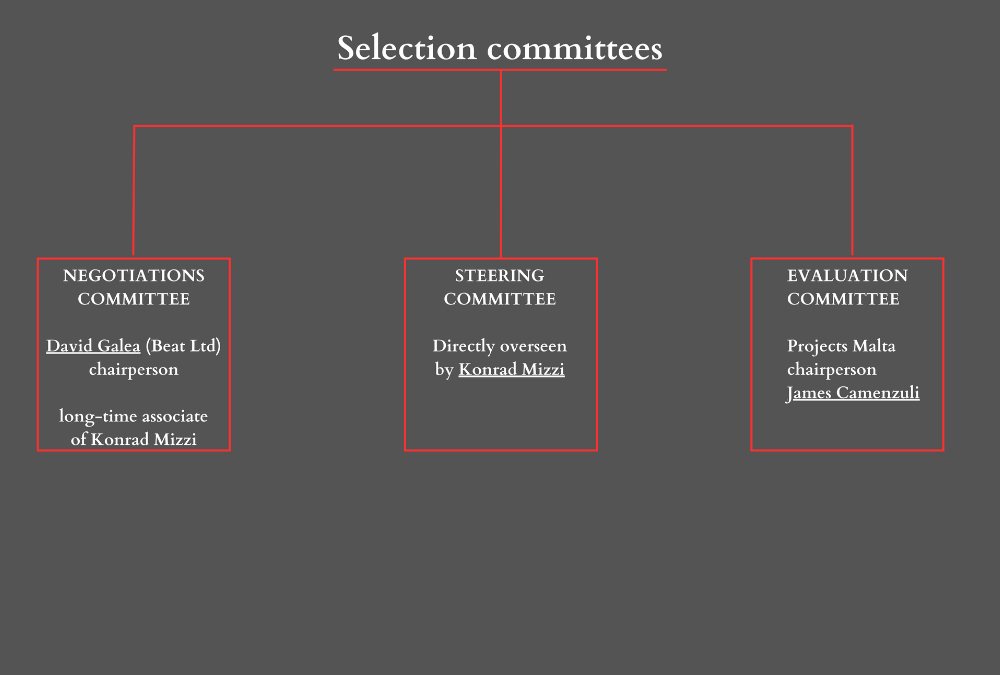
There were three committees reporting directly to Cabinet about their individual assessments at different stages: the negotiations committee which was chaired by David Galea, the steering committee which involved direct input from Konrad Mizzi, and the evaluation committee which was led by Projects Malta chairperson James Camenzuli.
Galea, a long-time associate of Konrad Mizzi, raked in hundreds of thousands of euros from direct orders and government contracts through his company Beat Ltd. Besides the hospitals concession, he was directly involved in other major projects which were linked with corruption, including the Electrogas deal.
VGH/Steward Healthcare
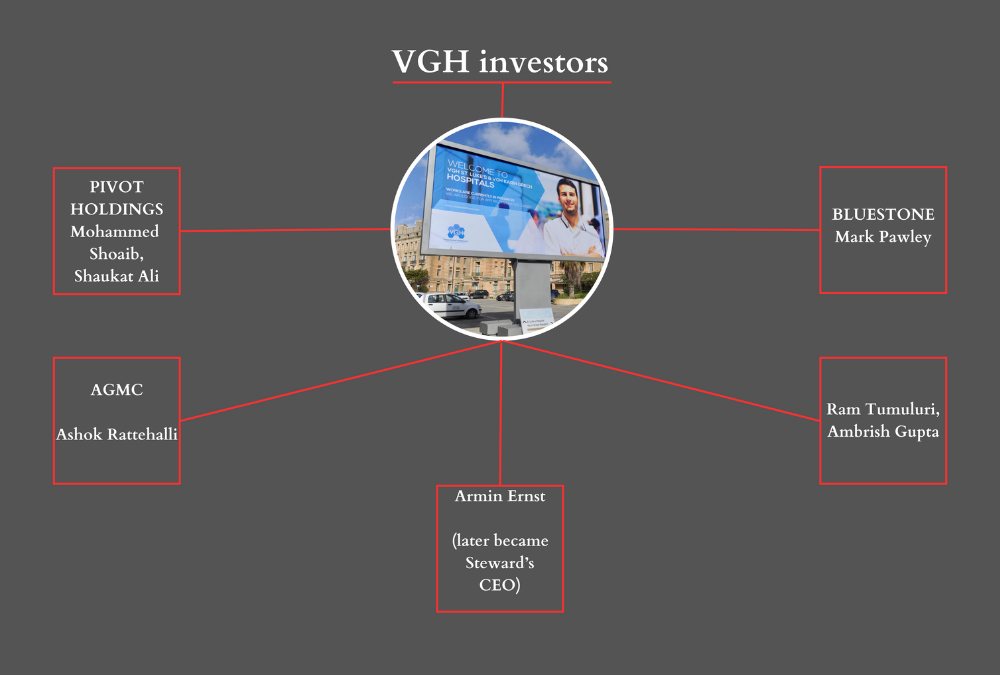
VGH’s investors put in work to hide the extent of their involvement in the deal, and had created complex company ownership layers involving offshore jurisdictions to mask their scent.
Shaukat Ali was one of the more influential investors in the deal. The Shift had written a detailed story about, among other things, Ali’s failed attempt to takeover St James’ Hospital and his general tendency to keep to the shadows throughout the whole deal. Ram Tumuluri, on the other hand, was the public face, only to then turn whistleblower with the United States’ Securities and Exchanges Commission. Shaukat Ali also had previous business links with disgraced former European Commissioner John Dalli, who was engaged as a consultant for the health sector by Joseph Muscat after the Labour Party swept to power.
Rattehalli had almost derailed the whole deal when he filed a warrant of prohibitory injunction which directly jeopardised Steward Healthcare’s acquisition of VGH’s operations. Rattehalli had instituted court action to “secure” his cut from the concession.
When initial reports began emerging about Tumuluri’s dubious conduct in overseas jurisdictions, Pawley defended Tumuluri as VGH’s choice for the company’s figurehead, lavishing praise on Tumuluri for “his professionalism and business conduct”.
Ernst was both VGH’s CEO and then Steward Healthcare’s CEO, and was one of the key public faces of the deal, often appearing side-by-side with Muscat and other high-ranking government officials in photo-ops and other similar PR offensives throughout the beleaguered concessionaire’s tenure.

